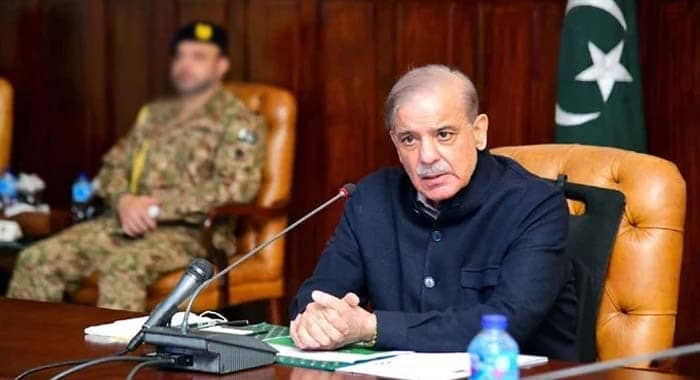As China calls for peace and regional cooperation, and Russia sounds alarms over the rise of IS-KP in Afghanistan, tensions between Islamabad and Kabul continue to surge, with Pakistan’s Prime Minister Shehbaz Sharif accusing the Afghan Taliban of attacking Pakistan at India’s behest.
In a high-level cabinet meeting, Prime Minister Shehbaz Sharif openly alleged that the recent spate of cross-border attacks from Afghanistan was carried out “at the behest of India,” escalating an already tense standoff.
“The Afghan Taliban launched attacks on Pakistan, provoked by India. We were forced to respond with full force,” the prime minister declared, as reports confirmed military operations in border regions targeting TTP infiltration routes.
Decades of Hospitality, Met With Terror
Sharif emphasized Pakistan’s long-standing hospitality toward Afghan refugees—over 4 million hosted for decades, even through internal economic crises.
“Despite limited resources, we supported them. We upheld bonds of brotherhood. But now, Afghan-based terrorists are targeting our police, our armed forces, and our civilians,” he said.
Raising critical questions about recent policy decisions, the prime minister pointedly asked:
“If terrorism had ended in 2018, how did it return? Who brought them back?”
A reference that analysts link to controversial peace deals and reintegration efforts post-2018 that saw former militants allowed to return and regroup.
IS-KP: A Storm Brewing in the North
Just as Pakistan grapples with Taliban-linked militancy in its west, Russia has raised red flags about an entirely different front—northern Afghanistan, where IS-Khorasan Province is now pushing for territorial control.
At the CIS intelligence summit in Uzbekistan, FSB Director Alexander Bortnikov revealed that ISIS-K’s leadership is attempting to establish dominance in northern Afghan provinces and breach the borders of Central Asia.
“They’ve made northern Afghanistan their next strategic base,” Bortnikov said, warning that Russian nationals are among the group’s growing ranks.
ISIS-K, he added, is aggressively expanding its propaganda network, now operating in Tajik, Kyrgyz, Uzbek—and Kazakh for the first time, pointing to a broader Central Asian recruitment drive.
Foreign Hands and Proxy Games
Bortnikov also alleged that foreign intelligence agencies may be facilitating the group’s growth—a veiled suggestion that some global powers might be using IS-KP to destabilise both the Taliban and the region, creating a dual crisis for South and Central Asia.
Russia’s concern aligns with Pakistan’s fears: both countries now view Afghan soil as an active staging ground for transnational militancy, whether under Taliban oversight or enabled by neglect.
UN Validates Terror Presence
Adding weight to these concerns, the UN’s latest Security Council report has confirmed that terrorist groups like Al-Qaeda and the TTP operate freely across six Afghan provinces, with new joint training camps for Al-Qaeda and TTP uncovered.
An estimated 6,000 TTP fighters are said to be operating from inside Afghanistan, armed with modern weapons, emboldening their cross-border attacks into Pakistan.
Ceasefire Holding—But For How Long?
Despite these tensions, a 48-hour ceasefire brokered earlier this week is reportedly holding—though sporadic border skirmishes and infiltration attempts continue. Pakistan’s military confirmed it recently thwarted TTP incursions in Mohmand district, killing dozens of fighters.
The presence of TTP in these attacks, despite the ceasefire, raises serious doubts over the Taliban’s commitment to peace, and/or the Taliban’s writ beyond Kabul.
The Diplomatic Tightrope
Amid the rising rhetoric and warnings, China has adopted a calmer tone. The Chinese foreign ministry welcomed the ceasefire, called for restraint, and offered to mediate, stating that “lasting stability requires inclusive dialogue and mutual cooperation.”
But that vision remains distant, as Afghanistan finds itself at the centre of multiple crises:
Pakistan sees it as a launchpad for state-sponsored terror
Russia sees it as a base for extremist expansion
And the Taliban continue to deny or deflect, despite mounting evidence.
Pressure Mounting on Kabul
The Taliban’s international isolation may be deepening. If the group fails to act decisively against terrorist groups within its territory, regional actors are signaling they may act unilaterally.
Pakistan’s statement that the Taliban are acting on India’s behalf marks a turning point—injecting a new geopolitical dimension into what was already a dangerous regional flashpoint.
The question remains:
Will the Taliban face this reality—or continue to deny what the world now acknowledges?





